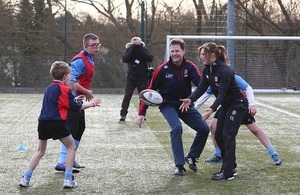Nick Clegg visited Twickenham to celebrate 拢2.2bn Rugby World Cup legacy
The Deputy Prime Minister visited Twickenham today (2 February 2015) to mark the start of the biggest year in history for English rugby.

Photo credit: Rugby Football Union.
The visit came just 4 days before the start of the Six Nations and amid preparations for the which will be hosted across 11 different cities and 13 different venues from Brighton to Newcastle.
The event, which starts in September, will bring hundreds of thousands of visitors to the UK, create 12,000 new jobs and give a 拢2.2 billion boost to the UK economy.
Today the Deputy Prime Minister visited Twickenham Academy with Business Secretary and Twickenham MP Vince Cable to take part in an rugby training session with some first year secondary school children.
He was joined by England鈥檚 most capped player, Jason Leonard, and Lydia Thompson from the England Women鈥檚 Rugby World Cup winning squad, and took part in a game of end ball and any direction tag.
The Deputy Prime Minister then went to Twickenham Stadium to meet with the Chief Executive of the Rugby Football Union and join in some teambuilding activities with young people led by the Dallaglio Foundation.
Deputy Prime Minister Nick Clegg said:
We all remember the incredible success of the 2012 Olympics and the 2014 Grand D茅part of the Tour de France in Yorkshire. They both left a legacy that the whole country can be proud of.
This year, we have the privilege of hosting the Rugby World Cup and it promises to the biggest ever for English rugby.
Not only will it bring billions of pounds to our economy and create thousands of jobs but it will leave a lasting legacy, building on the work here at the Twickenham Academy, inspiring youngsters from every background to pick up a ball. I want to wish the England team the best of luck in the year ahead. Lets make 2015 another great sporting year for this country.
RFU Chief Executive Ian Ritchie said:
This is an extremely important year for us. We have an overarching objective to develop rugby in England and the World Cup provides the ultimate shop window in order for us to grow the game. We want to be able to look back and say 鈥� great we have more people playing, coaching, refereeing and volunteering than ever before.
The RFU has committed over 拢25 million to date, to a 7-strand legacy project which includes the provision of better facilities, developing more coaches and with All Schools 鈥� taking rugby to state secondary schools that haven鈥檛 previously played the sport.
Building a legacy
By 2019 there will be 750 new state secondary schools playing rugby as part of the RFU鈥檚 All Schools Programme, which helps schools start and continue to play rugby. All Schools provides kit and equipment, coaching, staff training and importantly club links. With over 300 school already in the programme the RFU is on track to meet the target of 400 schools (200,000 secondary school children) playing rugby by the start of the Rugby World Cup in September this year.
Sport has been shown to produce happier, healthier and more socially cohesive individuals. Research undertaken by the RFU shows a correlation between playing rugby and GCSE results, with the impact being greatest in the most deprived schools.
Boosting the economy
-
this year we are expecting over 400,000 visitors to the UK to support their teams. They bring with them additional spending to the local economy (from hotels to transport services) helping to support additional jobs.
-
the Rugby World Cup will support 12,000 jobs along the supply chain and contribute 拢2.2 billion to the UK economy.
-
thanks to the geographic coverage these economic benefits are broadly spread 鈥� almost 拢1 billion of the 拢2.2 billion to be created by the RWC will be accrued outside of London. For example, in Newcastle, over 130,000 spectators are expected to converge on the city over a 2-week period. This influx of UK and international visitors will create plenty of opportunities for local businesses to benefit and is expected to generate over 拢93 million of output to the economy, supporting over 1,400 jobs.
Benefits attributed to host cities*
| City | Estimated output |
|---|---|
| London | 拢1,203 million |
| Brighton | 拢46 million |
| Exeter | 拢39 million |
| Cardiff | 拢316 million |
| Milton Keynes | 拢56 million |
| Gloucester | 拢48 million |
| Birmingham | 拢56 million |
| Leicester | 拢59 million |
| Manchester | 拢45 million |
| Leeds | 拢53 million |
| Newcastle | 拢93 million |
Jobs*
| Additional employees directly linked to the Tournament | 16,000 |
| Full-time employees delivering the Tournament | 300 |
| Jobs will be supported along the supply chain | 12,000 |
| Jobs created through the induced effect | 7,000 |
| Volunteers from around the country | 6,000 |
*Figures provided by Ernst and Young from their report